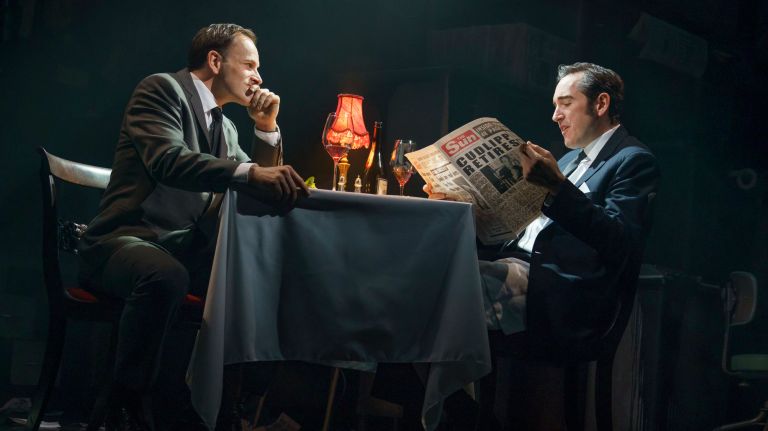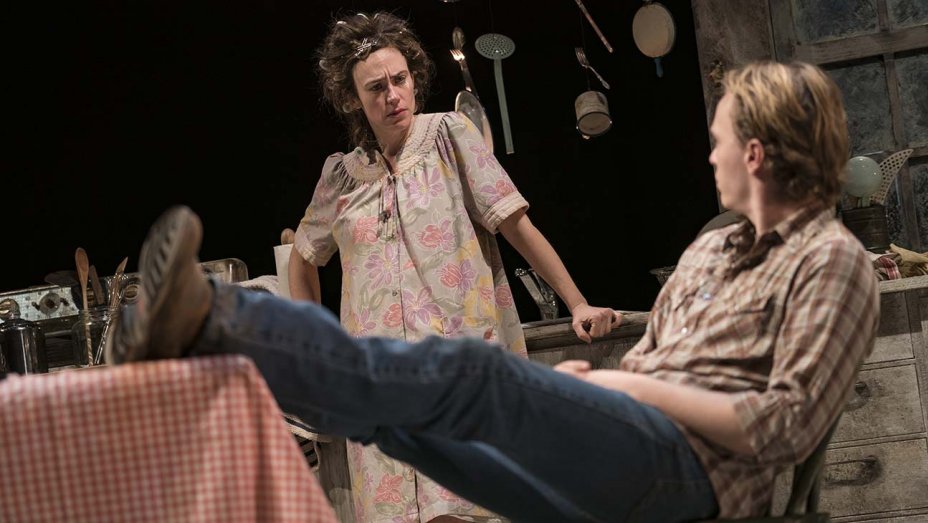When profit becomes the prime motive of conduct, bad things happens. That’s the message of a new English play and two American revivals. These plays were written over the course of 80 years and an ocean apart, but all three are powerful and relevant to our lives today. James Graham’s INK, now at the Samuel J. Friedman in a production for Manhattan Theater Club after a hit run in London, focuses on the degradation of British journalism in the late 1960s. All My Sons, revived by Roundabout Theater Company, was Arthur Miller’s first dramatic hit and blasted the complacent post-WWII America of 1947. Sam Shepard’s The Curse of the Starving Class premiered in London in 1977 and Off-Broadway in 1978 and offers an even bleaker view of the US, with its nuclear family exploding on a blighted landscape. Media, war profiteering, and land speculation are the symbols these playwrights employ to explore their themes of exploitation and devastation.

Credit: Joan Marcus
In the fact-based INK, Graham follows the rise of publisher Rupert Murdoch and editor Larry Lamb as they turn second-rate tabloid the Sun into a newsstand sensation by peddling scandal, fear, and resentment to a volatile British public. Set in 1969, the script mercilessly dissects Murdoch’s ruthless rise by means of concentrating solely on what sells and ignoring ethics and intelligent analysis. But the main character is Lamb who takes Murdoch’s sales-centered style and goes even further, taking advantage of murder and shame, even when it involves his own staff, if it means higher newsstand figures.
Graham’s fast-paced, almost-vaudeville-like play is given the perfect kinetic staging by Rupert Goold. The large cast scrambles around Bunny Christie’s jumbled jigsaw set of desks, filing cabinets, and printing presses in a series of rapid-fire vignettes depicting the lowest-common-denominator antics the Sun stoops to. The central action is Murdoch’s challenge to Lamb for the Sun to outsell the staid, respectable Mirror within a year. Graham hilariously and incisively depicts Lamb pulling out all the stops, throwing traditional morays out the window, and setting the scene for the political and cultural freak show that followed. The playwright only falters when he hands down a heavier indictment on Lamb for running nude photos than for exploiting—and possibly contributing to—the death of a co-worker’s spouse in a kidnapping plot.
Bertie Carvel is a sleek snake as the avaricious Murdoch, cunningly unstoppable as he puts money ahead of morals, while Johnny Lee Miller takes an even more intricate journey as Lamb. Miller carefully details the editor’s gradual, inevitable acceptance of Murdoch’s mantra of cash at all costs, skillfully depicting the slaughter of Lamb’s innocence. The nimble supporting company including Robert Stanton, Bill Buell, Tara Summers, and Rana Roy, juggle numerous supporting roles with dexterity.

Credit: Joan Marcus
While INK charts the descent of British public discourse into the gutter, All My Sons rips off the apple-pie surface of post-war America to reveal a cesspool of corruption. As the play opens, it’s a picture-perfect weekend morning in designer Douglas W. Schmidt’s idyllic suburban backyard. Successful businessman Joe Keller is reading the Sunday paper as neighbors cheerfully pop in and out, chatting about their lawns and picnics. The huge houses gradually become looming prisons as the true nature of Joe’s business becomes clear. During the war, his company shipped defective airplane parts causing the deaths of several pilots. He managed to shift responsibility to his milquetoast partner and now shares the rehabilitated business with his son Chris. But the unexplained disappearance of Chris’ brother in the war still haunts the family. Miller lays the symbolism on a bit thick at times (a tree planted as a memorial for the missing son is destroyed in a storm), but his message of blasting war profiteering and calling for individuals to take responsibility for improving society still packs a wallop.
Jack O’Brien’s straightforward production at the American Airlines slowly builds to a devastating climax as Joe and his wife Kate must face their complicity. Tracey Letts, one of our leading playwrights (August: Osage County), shows he’s also among our most intense stage actors, displaying Joe’s jovial friendliness and his cowering fear with equal conviction. Annette Bening in her first Broadway appearance in over 30 years, is just as heartbreaking as Kate, maternal and warm at first, but then drained of emotion and destroyed when her guilt is revealed. Benjamin Walker has the nearly impossible task of embodying the conscious of the playwright as Chris, but he manages to make him a believably conflicted man rather than a symbol of a generation.

Credit: Joan Marcus
Miller’s America is a sunny place slowly shown to conceal a metaphorical swamp. Shepard’s world in Curse of the Starving Class literally comes apart right away. In the opening moments of Terry Kinney’s harrowing production at Signature Theater Company, Julian Crouch’s grimy kitchen set comes apart to leave a chaotic nightmare of a household. Like many of the playwright’s families, the Tates are divided. Battling parents Weston and Ella are each planning to sell off the barely functioning family ranch while their disturbed offspring Wesley and Emma cling to the property in search of their identity. Dysfunction reigns as doors are destroyed, animals are butchered, gangsters invade and the refrigerator becomes the sole source of solace. Just as the Keller family represented a morally deficient America, the Tates are stand-ins for a lost nation, not even pretending to enjoy prosperity, but struggling just to make ends meet and fill that fridge. Kinney and his electric ensemble led by a scary David Warshofsky as Weston and a wily Maggie Siff as Ella bring Shepard’s blighted clan to disturbing, pulsing life. Lizzy Declement effectively taps into Emma’s adolescent anger and Gilles Geary is especially vital as a creepy, soulless Wesley. Like a rootless stalker, he grasps for meaning in simple tasks like building a new door and caring for a diseased lamb (a real one is onstage). When actors are not upstaged by live animals, it shows they’re really grounded in the material. Such is the case with this master Class in performing Sam Shepard.
INK: April 24—July 7. Manhattan Theatre Club at Samuel J. Friedman Theatre Tue 7pm, Wed 2pm & 7pm, Thu 7pm, Fri 8pm, Sat 2pm & 8pm, Sun 2pm. Running time: two hours and 40 mins. including intermission. $79—$189. (212) 239-6200. www.telecharge.com.
All My Sons: April 22—June 30. Roundabout Theatre Company at the American Airlines Theatre, 227 W. 42nd St., NYC. $59—$169. Tue 8pm, Wed 2pm & 8pm, Thu—Fri, 8pm, Sat 2pm & 8pm, Sun 3pm. Running time: two hours and 15 mins. including intermission. (212) 719-1300. www.roundabouttheatre.org.
Curse of the Starving Class: May 13—June 2. Signature Theatre Company at the Pershing Square Signature Center, 480 W. 42nd St., NYC. Tue 7:30pm, Wed 2pm & 7:30pm, Thu—Fri 7:30pm, Sat 2pm & 8pm, Sun 2pm. Running time: two hours and 30 mins. including intermission. $35—$55. (212) 244-7529. www.signaturetheatre.org.
